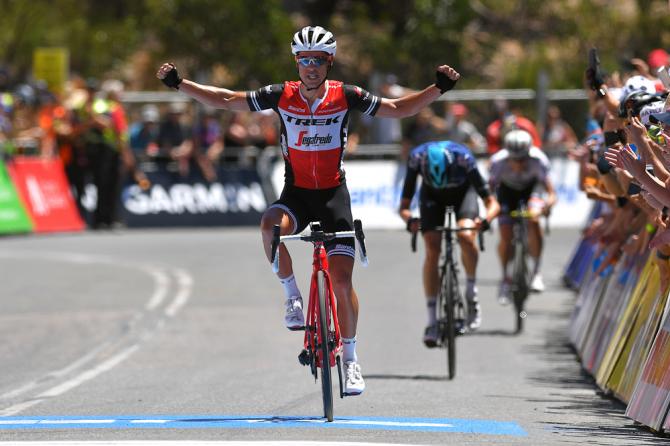5 conclusions from the 2019 Tour Down Under
Bevin, Ewan, Philipsen, Hayman and Porte key stories at this year's race
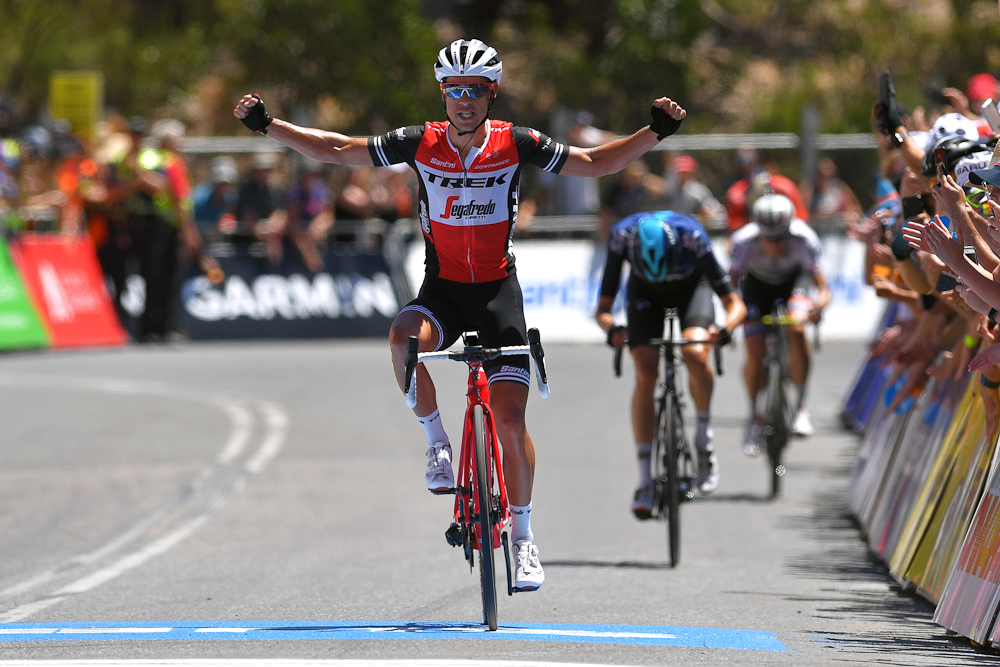
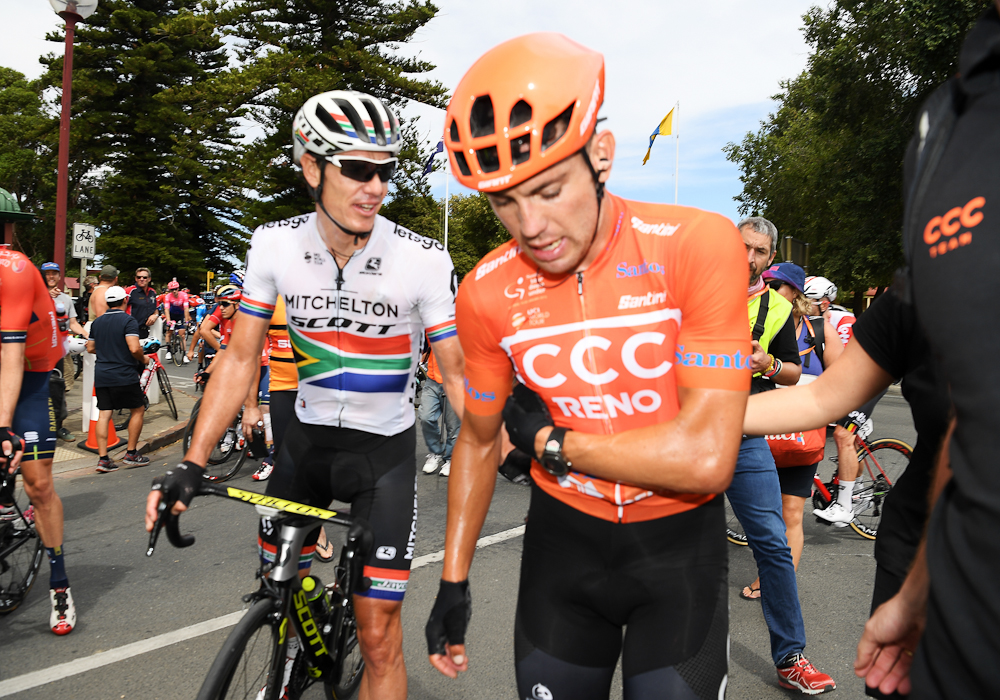
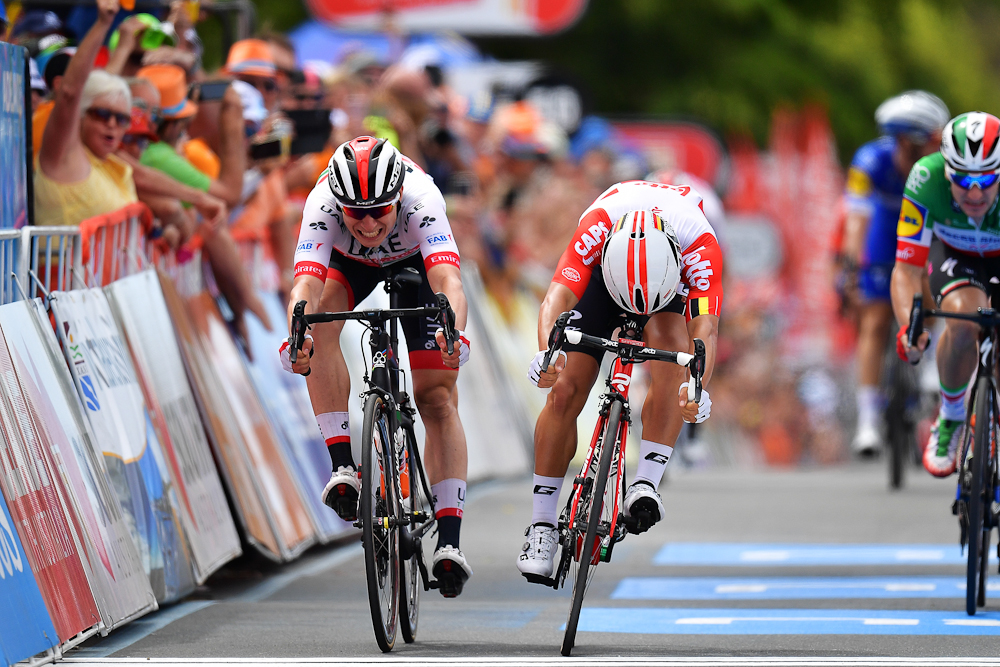
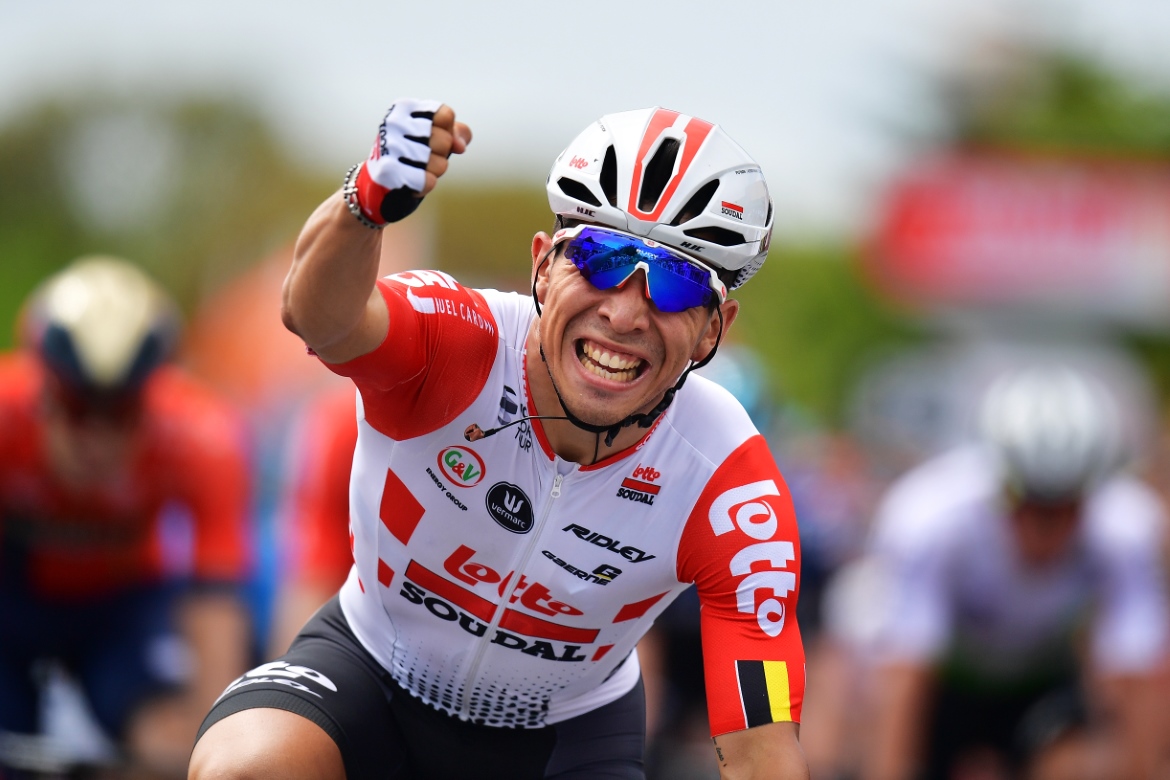
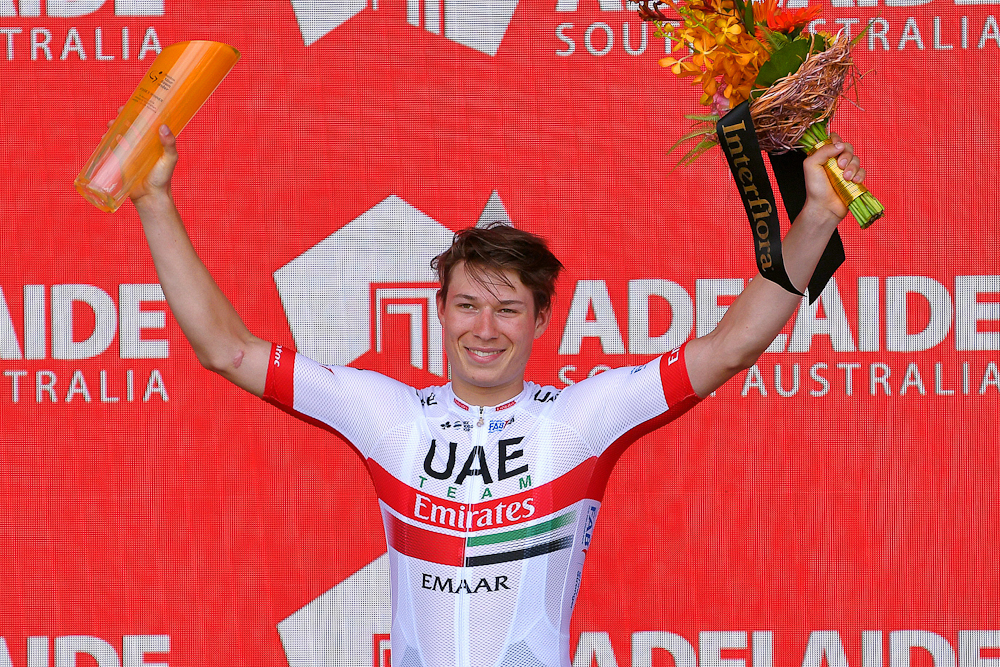
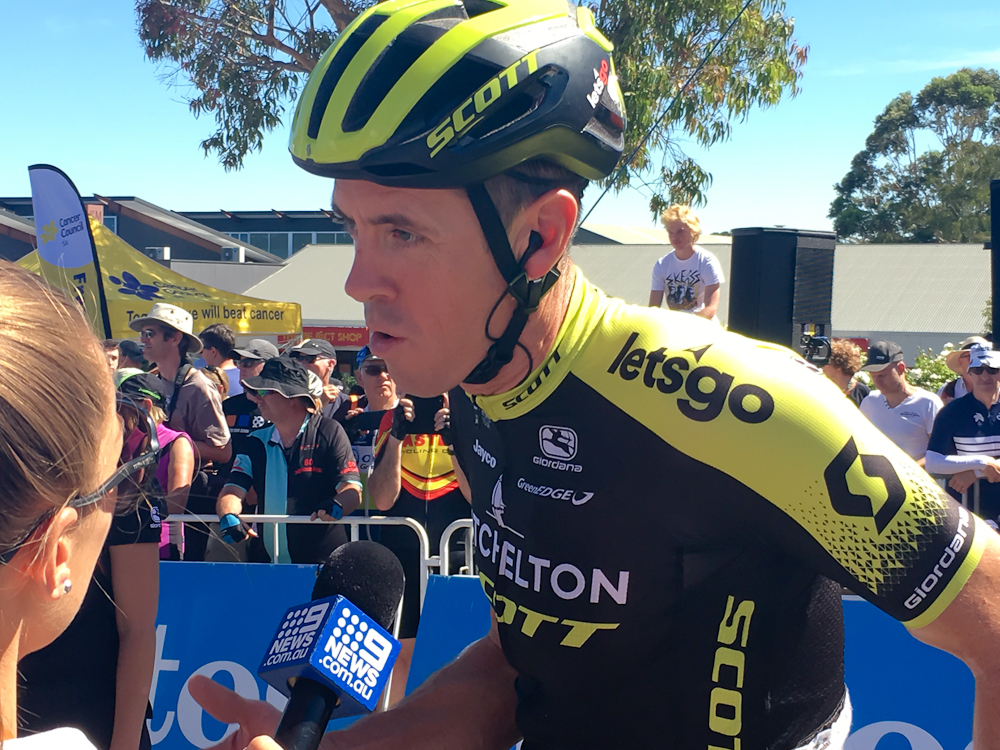
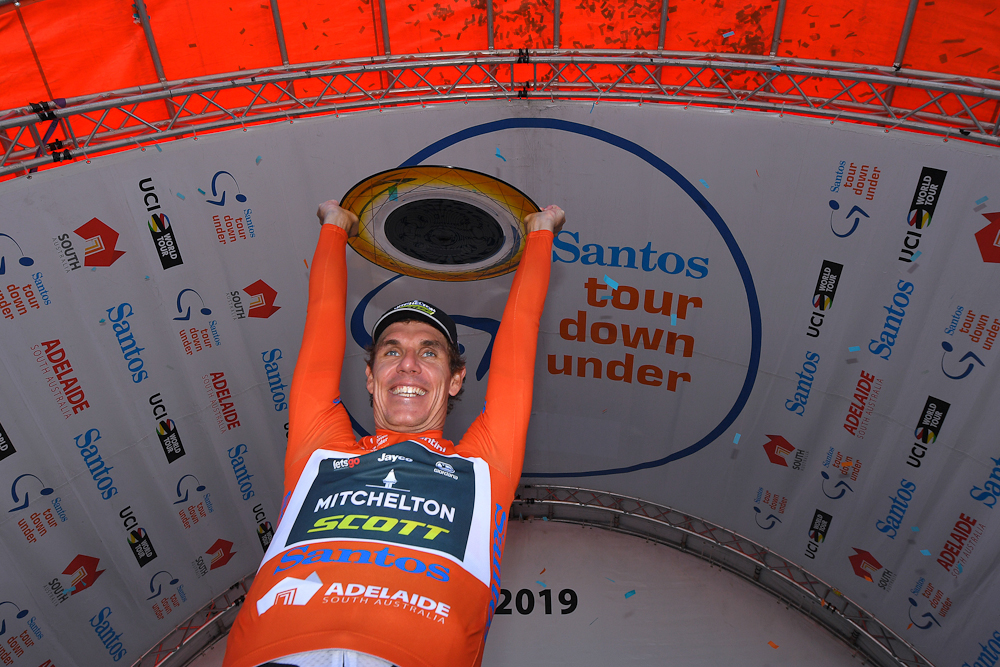
The 2019 edition of the Tour Down Under came alive thanks to Patrick Bevin's aggression and defending champion Daryl Impey's experience, and it soon became clear that it was those two riders who were most likely to beat the mountain men – Richie Porte, Wout Poels, Michael Woods – at their own game with the climb of Corkscrew back on the menu for stage 4 and Willunga Hill providing the race's climax on stage 6, along with a more-than-lumpy stage 3 – with Peter Sagan eventually flattening the latter.
While Sagan's emergence as the winner of a stage that had been billed beforehand by some as one of the toughest ever to grace the race seemed unlikely, with the stiflingly hot weather potentially playing a part in preventing the peloton from exploding quite as much as it otherwise might have done, there was no denying Bevin and Impey's contributions to a race that really should, on paper, have gone the climbers' way.
Bevin might have held his lead all the way to the end had it not been for his crash on stage 5, and while Porte attempted to pull the race apart with his attack on Willunga Hill on the last stage, it was Impey who came out on top to take his second overall win in as many years.
Here, then, are Cyclingnews' five conclusions from this year's race.
Bevin's a boxing fan
Absolutely central to the race was Patrick 'Paddy' Bevin's emergence as a genuine contender for this year's Tour Down Under title. He might have won it, too, were it not for his crash on stage 5, which, despite his injuries not being overly serious, prevented him from being at his best for the final stage, leaving him unable to defend his ochre leader's jersey.
After the New Zealander's CCC teammate Jakub Mareczko had finished third to winner Elia Viviani (Deceuninck-QuickStep) on the opening stage to Port Adelaide, you could have been forgiven for thinking – as many did, including the team, initially – that the bright orange jersey that emerged from the mêlée to win stage 2 in Angaston was Mareczko going two places better.
Soon, though, it was apparent that it had been Bevin who had followed Astana veteran Luis Leon Sanchez's last-gasp attempt to win the stage and then held off Lotto Soudal sprinter Caleb Ewan to take the win.
Get The Leadout Newsletter
The latest race content, interviews, features, reviews and expert buying guides, direct to your inbox!
Listening to Bevin's impassioned, confident views after stepping off the podium either as the winner of that stage, or as the leader of the race after stages 2, 3, 4 and 5, and having lost the race lead but won the blue points jersey after the sixth and final stage, it became apparent that we had a pugilism enthusiast on our hands – or a fan of boxing lingo, at the very least.
"Leading the race changes your tactics a bit," he'd said having taken the race lead after stage 2. "Obviously it means you have to absorb a bit more pressure, but I feel now as though we're in a great position to box on for the next four stages."
And, after losing the race on the final climb: "It's such a shame to do all that and have it kind of all come tumbling down. But there'll be another race, and, if nothing else, I'll be back at the Tour Down Under next year, ready to roll my sleeves up, and box on again."
The 27-year-old had certainly packed a punch in winning stage 2, then remained a contender on stage 3 and, despite being somewhat of a heavyweight compared to the 'climbing group' of Richie Porte, Wout Poels, Michael Woods and George Bennett who escaped on the climb of Corkscrew on stage 4, Bevin rolled with the punches and kept the race lead despite having been on the ropes.
Perhaps most impressively of all, after hitting the canvas in the crash on stage 5, a bloodied and punch-drunk Bevin got back on his feet and then his bike, proving that you can't keep a good man down, and fought back to retain his ochre leader's jersey going into the final stage.
It proved to be a round too far for him, but Bevin nevertheless refused to throw in the towel and went down swinging.
In CCC, Bevin's old BMC Racing team may have a new guise, but Bevin's corner have clearly given him a talking-to, and the gloves are now very much off.
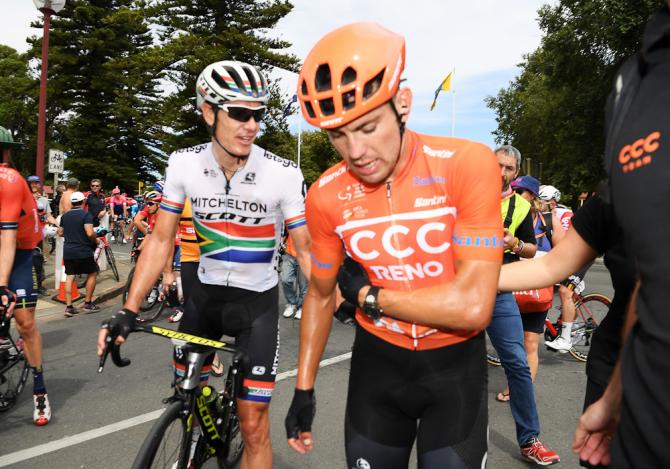
Ewan doesn't like losing
After winning the curtain-raising Down Under Classic two days before the start proper of the Tour Down Under, it wouldn't have been unreasonable to have expected Lotto Soudal's Caleb Ewan to take at least one more win from the three sprint stages on offer at the Australian WorldTour stage race.
Having been unable to be in the mix on the opening stage, which was won by Elia Viviani (Deceuninck-QuickStep), Ewan and his Lotto teammates regrouped for stage 2, where the Australian was then beaten to the line by CCC's Paddy Bevin.
Stage 5, then, became Ewan's last opportunity, and having battled with UAE Team Emirates' Jasper Philipsen to get onto the back wheel of Bora-Hansgrohe's Peter Sagan in the final few hundred metres, Ewan appeared to use his head to ensure that he, and not Philipsen, took prime position, and then burst out of the three-time world champion's slipstream to take the win, with Philipsen following him into second, and Sagan taking third.
He'd done it, but the race jury decided that he'd also done something else, relegating him to last place in the group for an "irregular finishing sprint" – UCI regulation 2.12.007, article 5.1, for those interested – and handed 20-year-old Philipsen his first WorldTour win.
Through a Lotto Soudal press release feistily titled 'Ewan has to hand back stage success', the sprinter voiced his disappointment at the decision, saying that those three headbutts, for which he'd been punished, had been an attempt to stop him crashing into the barriers as Philipsen "tried to push me out of Sagan's wheel".
"This is very disappointing," Ewan said. "I was so looking forward to my first official victory for Lotto Soudal. After crossing the line, it felt like a massive relief, but the next moment all of that joy disappeared when I heard that I had been relegated.
"Of course, I have to accept the decision taken by the jury, but I don't agree with it," he continued. "I wanted to protect myself and the whole peloton against a crash. The commissaires did not listen to our side of the story before taking the final decision. It will take a couple of days to process the disappointment. Now, it's mainly about finishing the Tour Down Under on a good note and focusing on new goals afterwards."
Ewan, then, doesn't like losing – which is about the best trait for a sprinter to have, if you ask us.
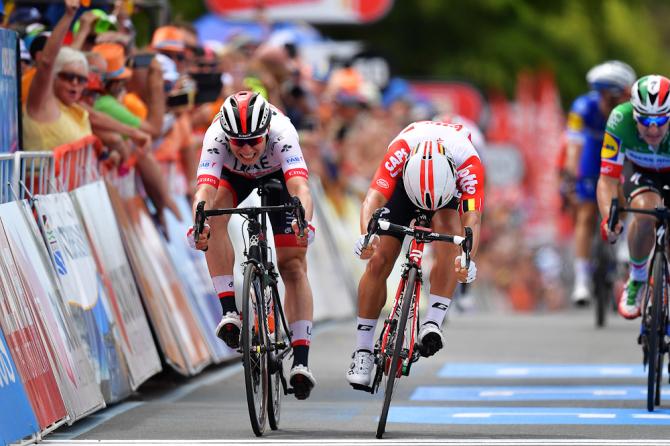
Philipsen has a fabulous future ahead of him
Talking of sprinters, UAE Team Emirates' Jasper Philipsen appears to have a very bright future, but rarely has anyone looked more like apologising for winning something than the 20-year-old Belgian.
Philipsen was handed victory on stage 5 after Caleb Ewan (Lotto Soudal) had finished first on the line before being relegated for having performed an "irregular finishing sprint" by using his head to ensure that it was him – and not Philipsen – who could use Peter Sagan's (Bora-Hansgrohe) back wheel to jump from and win the stage.
"The first thing that happened with Caleb was that I think we were both trying to be in a good position," Philipsen said after having been announced as the winner. "I was in the wind and I just wanted to also get on the wheel so that I didn't lose energy for the sprint.
"I think he just hit me twice with his head, and then the jury has decided it was wrong. For me, it all happened so fast. It was hard to see if it was wrong or not. I was just happy to have taken second on the stage, so it's a bit of a strange feeling to win, but for sure I respect the decision of the jury."
It's easy enough to see Philipsen's diplomatic point: Philipsen and Ewan had done what sprinters do to try to get on the 'right' wheel, and the more experienced sprinter had gained the upper hand – albeit slightly nefariously.
Philipsen, however, appeared to benefit from having then been left with Ewan's back wheel to follow, following him when he made his final burst for the line and finishing well ahead of Sagan.
"I think it's always different if you can raise your hands in the air when you win," Philipsen added. "I've got mixed feelings, but I'm still young, so hopefully a real win will follow in the coming years."
Of that, there appears to be very little doubt on the strength of his results Down Under: sixth on stage 1, fifth on stage 2 and then a win on stage 5.
Last season, in his first year as a pro, with Axel Merckx's North-American-based Hagens Berman Axeon Pro Continental team, Philipsen sprinted to a stage win at the Tour of Utah, and as the winner of the under-23 version of Paris-Tours the season before, he seemingly has a very bright future indeed as a sprinter.
Oh, and he's from Mol – which is the same Belgian town as a certain Tom Boonen. Philipsen is one to watch in 2019.
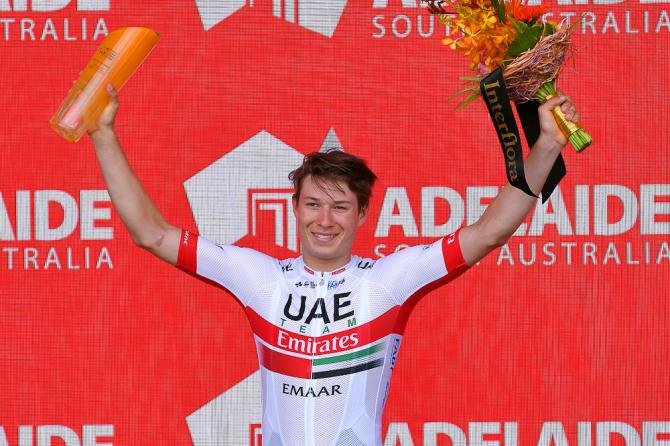
Mitchelton are going to miss Mat Hayman
By finishing the last stage of the Tour Down Under, Mitchelton-Scott's Mat Hayman has pulled the curtain down on a 19-year pro career that has included the huge victory that was his 2016 Paris-Roubaix win, while spending the majority of it helping his teammates to victories of their own on countless occasions – including Daryl Impey's second overall win at the TDU on Sunday.
Almost Hayman's very last act was to pull Impey from a mid-pack position in the lead-up to the final climb of Willunga Hill, deftly leading the South African up the left-hand side of the bunch via a smooth acceleration, dropping him off there with Lucas Hamilton, and then allowing himself to drift to the back of the group where a number of riders could be seen patting him on the back for a job – a career – well done before everyone knuckled down to the climb.
Hayman has been a huge presence at the Australian WorldTour team since he joined Orica-GreenEdge from Team Sky in 2014. He'll now continue at the team as a member of staff, learning the ropes on the other side of pro-team life, but with the memories of having helped his teammate win the GC in his last race.
"You don't get to choose, but I couldn't think of a better way to go out," Hayman told Cyclingnews at the finish.
"It was really nice to have a couple of guys congratulate me on my career there just before the last climb," he said. "Halfway up, I was thinking about my career, and ending, and then all of a sudden it was back to thinking about the race again. What a ride from Daryl. It's been a week's worth of work, which it always is for us, and he's a legend for finishing it off like that."
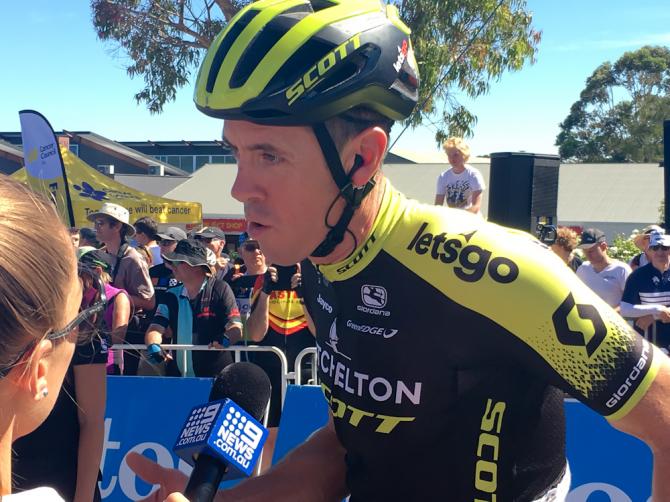
Can anyone stop Porte from reaching seventh heaven on Willunga?
As old-school dictaphones clicked off, phone recording-apps beeped to a stop, mics were dropped and TV cameras were swung away, a still-hovering journalist asked Richie Porte if he was going to make it seven wins in a row on Willunga Hill next year after the Tasmanian had made it six on the South Australian climb on Sunday.
"I'm getting too old," the Tasmanian grinned, but we don't believe a word of it. The King of Willunga looks set to reign for some time longer if Sunday's performance is anything to go by.
"This is a hard race for a rider like me to win," Porte had told the press. "It's a shame that there's not another hill-top finish. But to win six in a row with a new team is a nice way to start. It's a lovely day out there. You pinch yourself riding through the crowds."
Change the face of the race by adding more climbs to the week's route, and you may well regularly get a climber winning the race, but the current attraction for both Australia's domestic pros and the international riders from Europe is that there's something for everyone at a prestigious, well-organised, well-supported stage race held in stunning surroundings and, normally, warm weather – although ideally not as hot as it can sometimes get.
The switch of the Willunga Hill stage from the penultimate day to the final day in the end didn't make much difference, but the Tour Down Under, rather excitingly, has the rare honour of having become a race that can be won by either a climber, such as Porte or, say, EF Education First's Michael Woods, or a rouleur, such as Paddy Bevin (CCC) or eventual winner Impey, with the outcome decided at the very last second.
"You've got to climb better than the sprinters and then sprint better than the climbers," was Porte's summation of the race this year.
And while Willunga Hill remains the final major climb at the race – and why wouldn't it? – then it will decide the race, whether that's on the Saturday or the Sunday.
